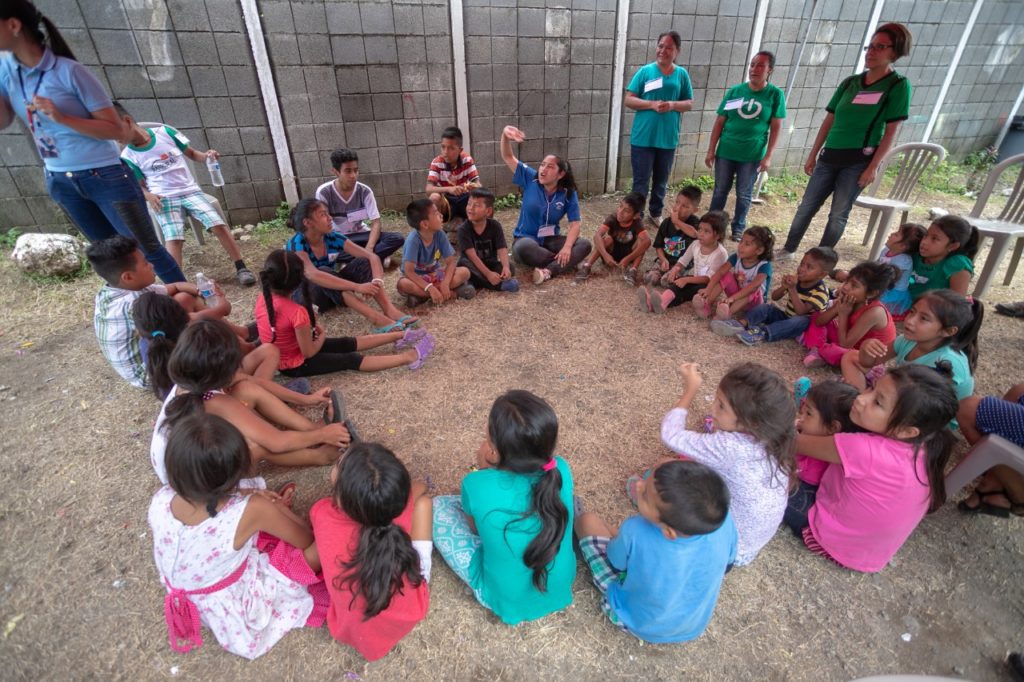Here’s what’s happening around the world in the area of child welfare and protection.

Photo by Ivan Palma for CRS.
Participation of children and young people in the design of household survey
Joanna Wakia, Sarah Neville, Tom Crea, and the CTWWC Guatemala and Kenya teams
Since its inception in 2018, Changing The Way We CareSM (CTWWC) has elevated the voices of people with lived experience of residential care to guide decision-making. CTWWC is an initiative designed to reform national systems of care through promoting safe, nurturing family care for children, emphasizing family strengthening, family reintegration, prevention of unnecessary child-family separation, and development of alternative family-based care. Through CTWWC’s demonstration, systems strengthening and influencing efforts, the voices and experiences of children, young people, and caregivers help guide policies and services provisions that are better aligned to the needs of those who need care, support and protection. In the first three years of operation, demonstration efforts have focused on Guatemala and Kenya, alongside influencing and promoting family strengthening and care with other actors around the globe. CTWWC is implemented by Catholic Relief Services (CRS) and Maestral International, joined, through a Global Development Alliance, by three donors (MacArthur Foundation, USAID and GHR Foundation) and working with key partners such as national governments, Lumos Foundation, Better Care Network, Faith to Action and many others.
CTWWC’s commitment to meaningful participation cuts across all activities, including monitoring and evaluation. In mid-2021, CTWWC designed an evaluation of the first three years of operation in which those with lived experience were engaged in the design process and not just as respondents. This evaluation included a household survey of children and caregivers in Guatemala and Kenya who had been reunified after residential care, or who had received family strengthening support after being identified as at-risk of separation. However, previous quantitative research of children who have lived in residential care institutions has tended to measure constructs chosen and developed by academics, especially those in the Global North, rarely relying on children’s first-hand perspectives.
To address this gap, CTWWC, in partnership with Sarah Neville and Dr. Tom Crea at Boston College School of Social Work, aimed to develop a new, quantitative measure of subjective well-being specifically tailored for children who live in or previously lived in residential care. With support from CTWWC’s teams in Guatemala and Kenya, two focus groups and five phone interviews were held with Guatemalan reunified children receiving post-placement services from CTWWC. In addition, six focus groups were conducted in Kenya with reunified children receiving CTWWC services, and six focus groups with Kenyan young adults who exited from residential care more than two years prior. Participants were asked “what life looked like” for reunified children and children in residential care who were enjoying well-being. The initial set of focus groups involved a participatory methodology to engage the young participants in drawing and hands on exercises to help the groups explore what they considered to be important well-being outcomes. Subsequent member-checking focus groups allowed initial findings to be further discussed and validated with additional young people.
The resulting lists of important aspects of well-being were compared with validated measures considered to be relevant to children’s care, based on a review of existing tools by the research team. The findings confirmed the need to consider areas of well-being already included existing in the reviewed measures such as food, shelter, and education, but also highlighted the need to bring an additional focus on aspects such as play and leisure, freedom to go out, and personal agency. These components were not found in the validated measures identified during the review. The team then constructed a 44-item quantitative measure of multidimensional, subjective well-being which will undergo cognitive testing and deployment in the household survey in Guatemala and Kenya in September and October 2021, and the results will be included in the CTWWC Year 3 Review. In addition, the tool’s psychometric properties will be analyzed and reported to inform further use. It is hoped that in the future this tool can be used in a wide range of settings with children who have lived in residential care.
The findings from CTWWC’s focus groups became available just before the UN Day of General Discussion on Children’s Rights and Alterative Care on 16th and 17th September 2021. This event also had a strong emphasis on participation of people with lived experience in the planning, submissions to the UN Committee on the Rights of the Child and during the event itself. During the event it was clear in the presentations from children and young people that the findings from CTWWC’s focus groups resonated with the advocacy from children around the world. A report submitted to the Committee (view document below), based on findings from a survey with 1,188 children and young people and led by a child and youth research team, flagged multiple times the importance children with experience of alternative care place on relationships – especially with peers and siblings, play, being happy, safe spaces, mental health, and emotional support.
It is clear that adults often prioritize basic needs, education, and physical well-being, whilst children and young people equally value the emotional, relational, and playful side of well-being. Therefore, it is essential that the voices of children and young people are placed at the center of all efforts to support, protect, and care for them. CTWWC’s development of a tool informed by children and youth’s lived experiences is a further step in this direction.